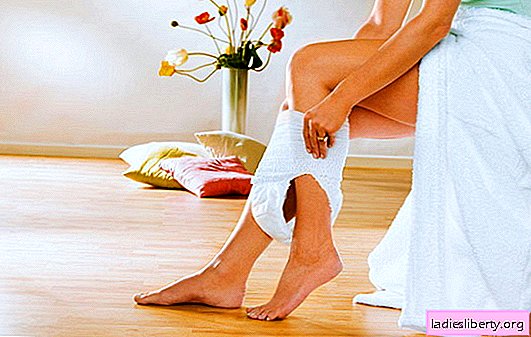
A woman during childbirth receives tremendous stress, from which it recovers for at least several days, and sometimes months.
At this time, her entire nervous system becomes very sensitive and sometimes it seems to her that an unpleasant odor emanates from her after giving birth, and sometimes it can actually happen.
If a woman thought that after birth there was a discharge with an unpleasant odor, urgently need to understand the causes and exclude the development of some diseases.
Bad smell after childbirth - causes
It is considered normal if, within 6-8 weeks after giving birth, a woman continues to have discharge that is not accompanied by unpleasant sensations (itching, irritation, unpleasant odor). After the discharge is completed, all women who have given birth will have a scheduled examination by a gynecologist to assess the condition of the uterus, cervix, vagina and sutures, if any after the delivery. If discharge appears with an unpleasant odor, then you should consult a doctor immediately, as this is a sign of an inflammatory process or some diseases.
Smell smell
In the first days after birth, vaginal discharge (lochia) is the most abundant, has a bright red color and a characteristic smell of blood. By about the 10th day, their number decreases markedly, the color becomes old or yellowish and a slightly ripe odor may appear, which, with proper hygiene, is not too noticeable. Such discharge is considered normal.
Fish or sour smell
The appearance of copious secretions of white or gray color with an unpleasant smell of fish or an acidic smell most often indicates a violation of the vaginal microflora caused by an intervention of a physical or medical nature.
The most common postpartum disease with these symptoms is bacterial vaginosis. The likelihood of receiving this diagnosis is increased if antibiotic treatment was carried out, stitches were placed on the tears in the vagina or on the cervix, and if personal hygiene was impaired.
With secretions with a sour smell and the presence of other symptoms (white curdled discharge, or lochia with an admixture of such secretions, itching), we can talk about candidiasis. This disease appears during a period of reduced immunity and is caused by a change in the composition of the vaginal flora. Unlike vaginosis, thrush requires treatment of both partners, since there is a chance of re-infection, even if the first time candidiasis occurs on its own.
A sharp putrid smell, lochia with an admixture of pus
During childbirth, especially if they were not carried out in the sterile birth ward, but at home or in unsanitary conditions, it is likely that the infection will be brought into the birth wound. The infection, depending on the location (vagina, cervix or uterine cavity, peritoneal cavity) can cause a number of diseases - endometritis, parametritis, perimetritis, puerperal colpitis, puerperal ulcer, postpartum peritonitis. Diseases of this group are acute or chronic. The acute forms are characterized by the rapid development of the inflammatory process on the affected organ, accompanied by severe pain, fever and accumulation of pus, which from time to time comes out with the usual vaginal discharge, but has a sharp putrid smell. Chronic forms are characterized by a violation of the cycle, pulling pains, body temperature may remain unchanged or be slightly increased over a long time.
After birth, discharge with an unpleasant odor - possible consequences
The consequences of the unpleasant odor of vaginal discharge are far beyond aesthetic limits and can be dangerous to a woman's health.
Conventional vaginosis, for example, irritates the mucous membrane and makes the genitourinary system vulnerable to various infections. That is why bacterial vaginosis is rarely found without concomitant diseases, and, in the end, leads to inflammatory processes in the uterus, tubes and appendages of the ovaries. In the future, this may affect miscarriages of pregnancy, complications during pregnancy and childbirth, and cause infertility.
In the case of inflammatory processes of postpartum wounds (in the vagina, on the cervix or in the uterine cavity), the consequences can be much more deplorable. Infection spreads deep into the body and first affects the remaining organs of the genitourinary system, and then the entire body, causing a disease called sepsis. Sepsis can develop literally in 1-2 days from a mild stage of the disease to septic shock with a fatal outcome. Therefore, after childbirth, you need to carefully monitor your health and timely come to the gynecologist for scheduled examinations.
Bad smell after childbirth - what to do
If there is an unpleasant odor after childbirth, it is urgent to identify the root cause of the changed nature of the lochia. It is impossible to do this at home, therefore an urgent specialist consultation is needed.
When contacting a gynecologist with a question about postpartum secretions with an unpleasant odor, a woman can expect:
• routine gynecological examination and smear on the flora;
• blood and urine tests;
• testing for STDs;
• smear delivery by PCR;
• ultrasound procedure.
First of all, the doctor asks the woman about how the birth occurred, whether there were complications, and studies the map of pregnancy and childbirth. Then, she necessarily examines the woman in the gynecological chair, simultaneously assessing the condition of the uterus and ovaries.
If there is a suspicion of inflammation of the uterine cavity (loose, enlarged), an ultrasound is prescribed, the results of which reveal the disease and the causes that caused it (remnants of the membranes or placenta, blood clots, etc.).
The efficiency of research and the doctor's decision on surgical intervention or prescribing medication has an important role, therefore, in the event of an unpleasant odor of discharge after childbirth, you need to contact trusted specialists. It is best if it is the same doctor who observed the pregnancy.
After birth, discharge with an unpleasant odor - is it possible to breastfeed
The appearance of secretions with an unpleasant odor after childbirth is not in itself a contraindication for breastfeeding, it is important to identify the cause of this smell and it is important to prescribe an adequate treatment to the nursing mother.
Thrush
A separate case is to consider thrush. This is a fairly common disease that is difficult to treat and recurs with the slightest violation of therapy.
A feature of candidiasis is its transition from one species to another, i.e. vaginal thrush, the presence of which was suspected by the unpleasant odor of secretions, can easily be transformed into thrush on the nipples, which is transmitted to the baby in the form of oral candidiasis.
In case of infection of the child by the mother during childbirth or breastfeeding, it is necessary to treat both with the exception of the treatment of contact of the mucous membranes. Many see this as a direct threat to breastfeeding, but in fact there is a solution. The child can continue to eat expressed breast milk if, before expressing, treat the nipples with a weak solution of potassium permanganate and monitor the sterility of dishes and milk bottles. Thus, it is possible to maintain lactation until the completion of treatment and the results of tests of the mother and baby confirming recovery.
Important! Even in the absence of external signs of the disease, it is necessary that the doctor remove this unpleasant diagnosis with the help of analyzes. The fact is that thrush bacteria multiply rapidly in a warm, humid environment, especially with the interaction of the mucous membranes of different people, so even being in the recovery stage it is easy to accidentally restart the disease.
Inflammatory processes
To answer the question of the advisability of breastfeeding during infection of the mother with infections, you need to understand what milk actually consists of. If you do not go deep into chemistry, milk contains immune factors. This means that if a nursing mother is ill with any disease to which the body is capable of producing antibodies and fighting the disease, these antibodies also get into her milk, unlike infection. In fact, it turns out that the baby uses the medicine for the disease along with the mother’s milk, but it is unrealistic to get an infection through milk. Thus, the fact is confirmed once again that breast milk cannot be harmful to the baby and is created to protect its immunity by any means.
If we are talking about the unpleasant odor of secretions after childbirth, then possible inflammatory processes are located in the organs of the genitourinary system and have absolutely nothing to do with breast milk. In this case, only the treatment that the mother receives can affect the ability to continue breastfeeding. In the case of postpartum inflammatory processes, treatment may be limited to the additional introduction of natural hormones that are produced in the woman’s body (for example, oxytocin for endometritis). In the case when it is impossible to do without taking antibiotics, it is necessary to warn the doctor that the baby is breast-feeding, because in most cases you can choose a relatively safe type of medication that does not significantly affect the body of the newborn.
Important! No matter how busy you are, no matter how much attention a newborn child requires, the appearance of an unpleasant odor after a time requires an urgent consultation with a doctor, since in some cases it can be about life and death.











